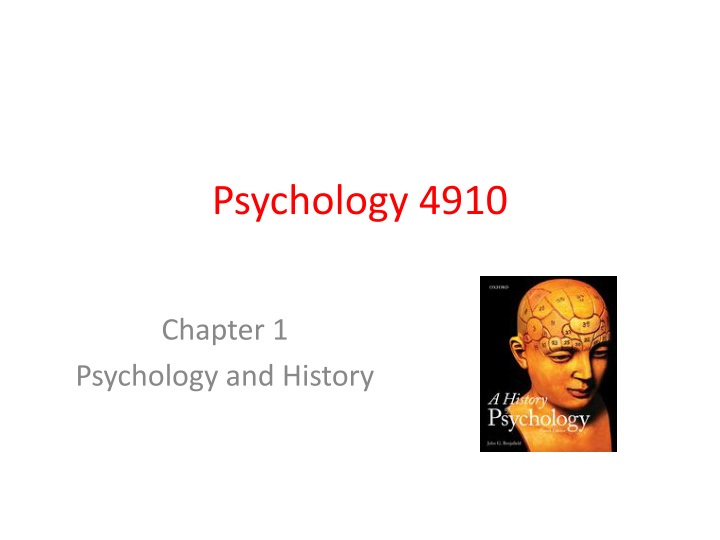
The History of Psychology: The Evolution of Thought
Explore the key approaches to studying the history of psychology, including the role of individuals versus the spirit of the times. Reflect on the progressive and cyclical nature of historical development in psychology, and the impact of paradigm shifts on the field. Discover how feminism has contributed to reshaping the narrative of psychology's past. Dive into the subjective components of psychology as a science and the concept of paradigm shifts proposed by Thomas Kuhn.
Download Presentation

Please find below an Image/Link to download the presentation.
The content on the website is provided AS IS for your information and personal use only. It may not be sold, licensed, or shared on other websites without obtaining consent from the author. If you encounter any issues during the download, it is possible that the publisher has removed the file from their server.
You are allowed to download the files provided on this website for personal or commercial use, subject to the condition that they are used lawfully. All files are the property of their respective owners.
The content on the website is provided AS IS for your information and personal use only. It may not be sold, licensed, or shared on other websites without obtaining consent from the author.
E N D
Presentation Transcript
Psychology 4910 Chapter 1 Psychology and History
Studying the History of Psychology There are two approaches to history: Person: emphasizing the role of the creative person that moved history along. Zeitgeist: the spirit of the times. You must understand the cultural context in which one s work takes place.
Studying the History of Psychology Eg. Was the theory of evolution the result of Darwin s genius, or would it have been produced by someone else anyway.
Studying the History of Psychology Ixion s Wheel v. Jacob s Ladder Is history progressive or cyclical? Progressive: Moves continuously forward to a fixed or indefinite end, getting better and better along the way. Cyclical: Circular in nature, eternal recurrence. Ideas may go out of fashion and then re- emerge down the road.
Studying the History of Psychology The history of psychology is probably both. Like a spiral, moving upward and in circles at the same time. Ideas are constantly being re-discovered but in more sophisticated way.
The New History of Psychology and Science Psychology is a science, but science has a subjective component. Science does not develop continuously and smoothly. Thomas Kuhn suggests that there are paradigm shifts.
The New History of Psychology and Science Paradigm: A set of fundamental beliefs that guide scientists and shapes their view of the world. In a paradigm shift, an old paradigm is overthrown and a new way of thinking emerges. Eg. Evolution
Feminism and the Psychology of Feminism Feminism has changed the history of psychology by identifying distortions and biases in psychology. Previously, the contribution of women to psychology had not been acknowledged. Women who had received their PhD in psychology between 1906 and 1945 were making 40% of what men were making.
Feminism and the Psychology of Feminism Women often took inferior positions due to family responsibilities
Feminism and the Psychology of Feminism Kimball: Two traditions of feminist scholarship 1. Emphasized overwhelming similarities between genders e.g., Leta Hollingworth 2. Emphasized undervalued characteristics (e.g., caregiving) traditionally associated with women e.g., Evelyn Fox Keller
Feminism and the Psychology of Feminism Evelyn Fox Keller Struck by: The relative absence of women in the sciences The fact that the style of thinking practised by scientists had a masculine origin Argues that: Gender and science are social constructions We need to be aware of the science- gender system Consider how science is also personal and social in nature Does not mean ignoring successes of masculine in science
Psychology as a Social Construction Psychology is not the objective accumulation of knowledge. It is driven by social processes. There are both exogenic and endogenic processes involved. Exogenic: Coming from the outside. External factors shape the human experience.
Psychology as a Social Construction Endogenic: Coming from inside. Humans have tendencies to think, categorize, and process information. These tendencies shape our knowledge.
Psychological Research as a Social Construction Implies that research is not objective. In a sense, this is true. Experiments chosen depend on Ethics Economics Policy interests, etc.
Psychological Research as a Social Construction A manuscript is full of rhetorical deftness and artful editing. Putting best foot forward Data analysis often depends on viewpoint. Eg. trends Whether or not a study is reported depends on viewpoint.
Psychological Research as a Social Construction But research can be a social construction and still be true in an objective sense. Eg. double helical nature of DNA Research can still have empirical content. Research is not done in a vacuum, it is not private. Psychology consists of social objects constructed through the interaction of real historical individuals.
Reconciling the Old and New Histories The new history points to omissions in the history of psychology. The older history engaged in presentism. Evaluate the past in terms of relevance for the present They failed the understand earlier works in its own terms.
Reconciling the Old and New Histories This is opposed to historicism. The understanding of the past for its own sake; valuing the past more than the present. There must be a balanced approach. Rediscover what the psychologist was trying to accomplish. Do not assume they were trying to lay the groundwork for what we have now.
Reconciling the Old and New Histories We cannot be too critical previous thinkers. Eg. Sigmund Freud, Jean Piaget














